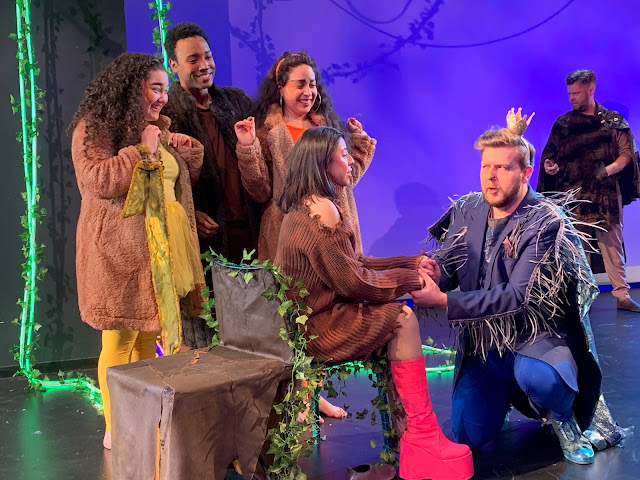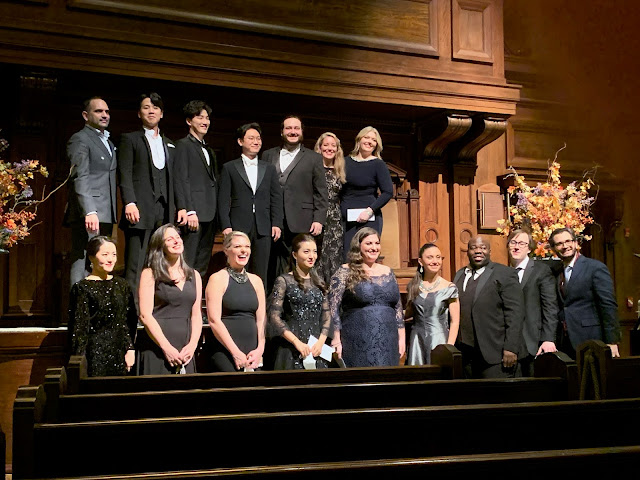MISSION
Saturday, December 18, 2021
IF THE SHOE FITS
Friday, December 17, 2021
FUN(D) RAISING
Thursday, December 16, 2021
RUSSIAN PASSION
Monday, December 13, 2021
PREMIERE OPERA FOUNDATION FINALS
GROWING WITHOUT GROWING PAINS
Meet Classic Lyric Arts superstars--pianist Xu Cheng, director Daniel Isengart, tenor Scott La Marca, baritone Chen Xi, soprano Laura Soto-Bayomi, and mezzo sopranos Briana Hunter and Shannon Delijani!
Classic Lyric Arts, helmed by renowned professor, coach, and collaborative pianist Glenn Morton, is well known for its intensive summer programs in both Italy and France. They are now expanding into The Berkshires for yet a third program--this one focusing on the operas of Mozart. Staying that close to home this past summer because of Covid has made this new addition seamless. Growth is good! Students will have the opportunity to enroll in any or all of the programs.
We felt privileged to attend their soirée last week to hear some of our favorite artists, some of whom have sung at Voce di Meche's House of Music and others who were new to us. The evening was coached by Daniel Isengart who has added great performance value to CLA's intensive programs and is now an esteemed faculty member.
To avoid deciding which artist to mention first, let us go according to fach with pride of place given to Laura Soto-Bayoni who has a sizable soprano and a personality to match. Because of our focus on emerging artists, we rarely get to hear big voices and hearing Verdi was a special treat. An arresting account was given of "Non so le tetre imagine" from Il Corsaro. This aria is filled with emotion which colored her delivery of the text. The melodies are gorgeous and Ms. Soto-Bayoni leaned into them with effective phrasing and an affecting vibrato.
She was no less impressive in "Stridono lassu" from Leoncavallo's Pagliacci , showing a real flair for verismo. We are pleased to report that the birdsong so beautifully created on the piano by Xu Cheng entered our consciousness doubly as her stunning soprano convinced us that we could also see the birds in our mind's eye. Now that's artistry!
More flexibility was demonstrated in a duet with Mr. La Marca--"Tornami a dir che m'ami" from Donizetti's Don Pasquale in which both young lovers expressed their affection by means of some lovely phrasing of Donizetti's charming vocal line. We do love duets and the two voices blended perfectly in happy harmony.
Shannon Delijani was heretofore unknown to us but we are glad to have this lack remedied. Ms. Delijani has a striking presence that seemed to announce the striking voice we heard. Our favorite piece was "O mon Fernand" from Donizetti's La Favorite. We have loved this aria so much in Italian and we didn't expect to enjoy the French version but, thanks to some perfect French diction we were similarly enthralled. We have a great enthusiasm for bel canto and it strikes us as more difficult to perform on French vowels but Ms. Delijani was undaunted. The handling of the lower register had just the right mix of chest and head voice. The cabaletta was powerful.
Her facility with French served her well in Chabrier's chanson "Les cigales" which requires rich coloration and good dynamic control. Ravel's "Kaddisch" was performed in Hebrew which was made to sound as beautiful as French. We felt a sincere commitment, made doubly impactful by the spare and haunting piano accompaniment.
Mezzo-soprano Briana Hunter possesses an amazing repertoire of expressions and gestures, all of which were brought to bear on the Habanera from Bizet's Carmen. We forgot every time we had heard it before and experienced it as if brand new. Her Carmen is a mercurial one and each gesture and expression seemed to emerge from the text.
Ms. Hunter's complete comfort in the French language was heard in "Elle est la pres de lui" from Thomas' Mignon. It was emotional; it was believable; each gesture supported the voice. There is so much strength in the lower register!
Tenor Scott La Marca did his best work in Turina's "Los dos miedos" which he had performed in our House of Music. Regular readers may recall how much we love Spanish music and this is one of our favorites; we have not heard it sung better. The text is psychologically valid; the musical line is apposite; the performance was stellar. As we said before, the romantic duet with Ms. Soto-Bayomi was a big hit in which Mr. La Marca paced his tenor part to perfectly match her soprano line. Beautiful blending!
As if that weren't enough, we had a surprise guest who wasn't on the program. Guest artist Chen Xi sang Tosti's "Ideale" with the same commitment we heard in the rest of the program--a feature which made it seem as new as the Habanera. We loved the resonance in his lower register. This was the icing on the delicious cake served up by Classic Lyric Arts!
Xu Cheng's collaborative piano served each piece, each style, each composer, and each singer. This versatility should serve him well in his future career.
© meche kroop




